
Need for Speed: Hot Pursuit
Written by: Rik
Date posted: July 8, 2018
- Genre: Racing
- Developed by: Criterion Games
- Published by: Electronic Arts
- Year released: 2010
- Our score: 9
It seems a shame to start a write-up of such a beautiful and brilliant game with a spot of admin, but Need for Speed is a long running series with some occasionally confusing naming practices that we’ve covered in a rather haphazard fashion over the years, so it sort of feels necessary.
The first game to carry the Hot Pursuit name (and the last to include a number that was actually helpful) was Need for Speed 3, an early favourite in these parts. Four years later, the name was resurrected for Hot Pursuit 2 (the sixth NFS game), the PC version of which was underwhelming to say the least. In 2003 EA Black Box revived the series with the Fast-and-the-Furious-inspired Underground and produced a number of decent follow ups, of which 2005’s Most Wanted (a name confusingly also later reused in 2012) was the undoubted high point.
After a couple of iffy titles in a row (ProStreet in 2007 and 2008’s Undercover), EA adopted a new strategy of giving the NFS name to different teams in an effort to meet their demanding yearly release schedule. In 2009 Slightly Mad Studios gave us Shift, a track-based racing sim of moderate repute, while Black Box were given until 2011 to work on what turned out to be their series swansong, The Run. Sandwiched in between them was this effort, pitched as a reboot/re-imagining of the Hot Pursuit brand, courtesy of Burnout developers Criterion.
The notion of Need for Speed returning to its roots is a slight misnomer, as it’s never really been true to itself, with the series constantly reinventing itself according to market forces over the years. But in the sense that the series was once about driving exotic cars on public roads and later became more embroiled in street racing culture, camp video cut-scenes about earning respect on the streets and – by the time of Undercover – drifting into GTA/Driver style territory, Hot Pursuit does represent a return of sorts to the base concept of earlier games. This is a game about the open road, fast cars and the police, with little further context other than it all seems like the kind of thing you’d want from a good arcade racer.
The meat of the action – indeed, pretty much all of it in single-player – is in the career mode and, for once liberated from the notion that you are a real street punk with only enough money for, say, a Chrysler Neon, but ambitions of earning more cash – and respect – there nevertheless remains the traditional structure of serving up the slower cars at the start and making you unlock the faster ones as you progress. Perhaps out of a misguided sense of brand loyalty, or a nod to freewheeling Criterion title Burnout Paradise, you can drive around the fictional town of Seacrest outside of the individual challenges, but I imagine most will choose to pick their events from the map and get on with it.
(As an aside: at the time of release much was made of the social and online elements of Hot Pursuit, comparing times and achievements against friends and uploading on social media etc. I don’t know whether such features are still fully supported but as I refuse to engage in such things unless absolutely forced to I bypassed the account creation altogether. Sorry!)
As with previous Hot Pursuit games, you can operate on both sides of the law, and the career mode allows you to complete both in parallel, which seems to make sense in terms of playing the game if not for those who see themselves in character as an outlaw racer one minute and super-cop the next. The map shows available challenges, which come in various flavours. In each the same basic racing fundamentals apply: you’ll be racing on long straight roads, with traffic, and occasionally called upon to powerslide around long, wide corners. In a callback to both previous NFS games and Burnout titles, you earn nitrous boosts by driving a bit dangerously – on the wrong side of the road, narrowly missing cars, etc. Acquisition and use of nitrous forms a core part of the game, particularly to get the best achievements on time based challenges. So it probably goes without saying that the part of NFS that was borrowed from early Test Drive games is not part of this return to roots: this is an arcade racer, pure and simple.
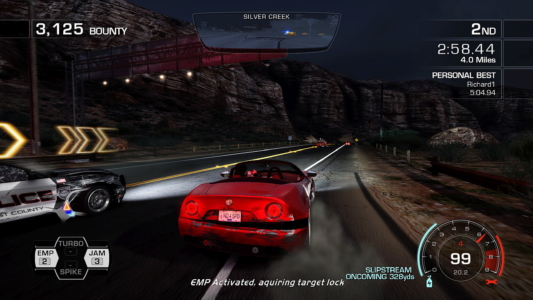
A certain amount of visible damage modelling is included, but with real manufacturers involved it’s a lot less messy than Burnout.
The Hot Pursuit and Gauntlet modes are the only ones to feature the police, and are the most complex as there’s a variety of equipment at your disposal to throw them off course. Here the links to Burnout, which had a strong crash survival element, are more apparent: the concept of being stopped by a police officer for a finger-wagging cut-scene or display of overly physical handcuffing has been abandoned, and instead you keep going until your car has been destroyed. It may not make much sense to have you plough into a roadblock, play a slo-mo crash sequence, then immediately reset you on the road with a rolling start, but it makes these chases work better. In Hot Pursuit, you’re one of many racers chased by police; in Gauntlet, you’re solo, but you have to also beat the clock.
As you progress, you get access to weapons to help you throw off pursuers and disable competing racers, from spike strips to targeted EMP blasts. As your racer’s arsenal expands, though, so does that of the cops, who can also hit you with spikes and EMPs as well as roadblocks (which still leave suspicious car-shaped gaps) and helicopters (this time dropping spike strips rather than exploding barrels). On the cop side, there are fewer event types, but they mirror their racer counterparts pretty well: in Hot Pursuit, it’s the same, except you’re the pursuer; in Interceptor you have to bring down a solo racer; and Rapid Response acts as a time-trial, albeit one where you accrue time penalties for hitting scenery and traffic.
It’s a fast, bright, good looking celebration of flashy cars, beautiful scenery and the open road, and although the core elements remain the same in each challenge, the different event types all have a distinctive feel. Time-trials feel like the purest exploration of the main driving mechanics – here you learn to perfect cornering, work out the pros and cons of various shortcuts, and master the use of nitrous. Duels, meanwhile, genuinely do feel like a proper head to head race with a rival, while the pursuit events are a real battle, in a different way to the prolonged tense chases of Most Wanted, in which the only options are to be caught or lose them somehow. Here it’s destroy or be destroyed.
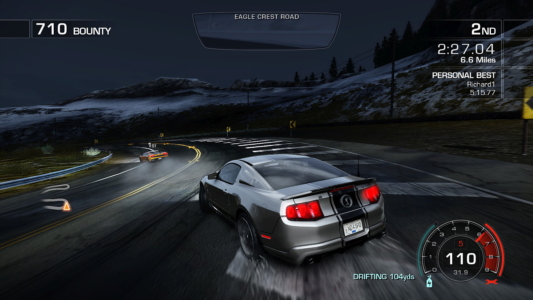
A duel pits the sleek, arrogant Lamborghini against the brawny, muscular Shelby (and if you like talk like that you’re in for a treat when listening to Hot Pursuit’s descriptions of each car).
Clearly, there’s a ludicrous element to all of the action. As we mentioned, the police could easily catch you when you crash, but it’s better for the game that they don’t (although slightly annoying when you play as a cop, and the only way to make a bust is to smash a racer as soon as possible after the initial collision). You feel though that this is acknowledged and embraced with tongue gently resting in cheek: the sight of a million-dollar supercar being sent spinning upside down into some trees as a result of your actions while a voice-over says “I’ve issued a ticket and a warning” has a knowing quality. Plus the Seacrest PD have seen fit to invest in a fleet of supercars that almost exactly mirrors the available selection of pursuit cars. A pursuit Koenigsegg – your tax dollars at work.
If the daft militarised element of police work is hardly mocked outright, the selection of vehicles and weaponry does seem hyped up to the point of seeming unreal, even down to little touches like the cutscenes showing your cop car responding to a call: performing a reckless U-turn in front of civilian traffic at the start, before it’s revealed at the end that your breakneck 10 mile trip was all in the name of stopping a single Audi saloon, a situation which already seems to have been adequately covered by your colleagues.
Elsewhere, the car porn element seems equally overblown, and early races see you unlocking what seems like thousands of new vehicles at every turn, each one introduced with a vaguely comical photo-snap camera sound-effect, a daft one-line summary direct from the manufacturer (“It goes really fast” etc) and, if you don’t immediately click through it, a glossy voice-over with some lengthier bumph about the car’s personality, or whatever. While you do get all of that gently amusing nonsense, there’s little useful information about performance, beyond grouping vehicles into classes of roughly equivalent power and providing a statement for top speed and 0-60, the latter of which is almost redundant given that 90% of the time you’re given a rolling start anyway. Loading screens give hints about avoiding shortcuts with certain vehicles and choosing bulkier ones for pursuits, but it’s all a bit vague. Having said that, you do get a different feel for different models and develop preferences that go beyond where the meagre performance information provided might guide you, and I particularly enjoyed choosing a big bulky Bentley to face off against more nimble supercars, even if such a strategy wasn’t always successful.
Bounty is the XP currency which indicates your general progress and determines vehicle and equipment unlocks, and a notable feature of Hot Pursuit is thay it rewards you for races that you don’t win. The racing itself is balanced in such a way that quitting and restarting, a hallmark of Black Box titles, is a rare occurrence. Obviously this means catch-up logic is involved, but not in that horrible “lead all race then make one mistake on the final lap and lose” kind of way. Without ever diminishing your desire to beat the gold medal achievement (and mine was such that I can’t even explain what is technically required to progress as I wouldn’t move on without a gold in every race) it does feel as if you’re rewarded for your time rather than wasting it on repetitive nonsense. Some challenges feel a little cheap, some too tough (the first time trial in the mountains with the McLaren F1, I thought I’d never beat) but in general they’re well balanced, set up for a handful of attempts at most. It’s a long game, but lacking the grind of the Black Box era.
Complaints are few, but worth noting. My biggest bugbear was the habit (again, borrowed from Burnout) of ceding control of your car to the computer so you can watch a crash scene: not just because it gets a bit annoying after a while but also that sometimes the timing of the return isn’t always the most convenient. Some challenges really aren’t good: during police Interceptor events, perhaps in another attempt at brand continuity, it seems to want to be Most Wanted, making you pursue a single racer who tries all kinds of tricks to lose you, taking shortcuts, making U-turns and darting here and there. But the game isn’t set up for nimble twists and turns: it’s all about driving in a straight line and drifting around long corners, so it doesn’t quite work.
And on that note, weaving in and out of traffic isn’t quite the same as in the Black Box games: civilian cars are more like occasional dots in the distance moving quickly towards you that you have to dodge as they approach. Rather than being the result of an unsuccessful slalom, collisions here are more likely to come from powersliding around a blind corner. As we’ve acknowledged, Hot Pursuit is a different beast, and being different doesn’t necessarily mean worse, but fans of previous games might miss that part of the experience. And finally, the music is almost totally forgettable, and as someone who became quite attached to songs featured on the soundtracks of previous NFS games, this was also a minor disappointment.
Otherwise, though, Hot Pursuit is a triumph: a successful reinvention of the series and the the kick up the arse it needed, boiling it all down again to the thrill of driving fast and dodging police. There are echoes of the Burnout games, but even if you’re not a fan of those in general or even the fêted Burnout Paradise in particular, there’s enough NFS in here to distinguish Hot Pursuit as a part of this series, of which it certainly establishes itself as a highlight.

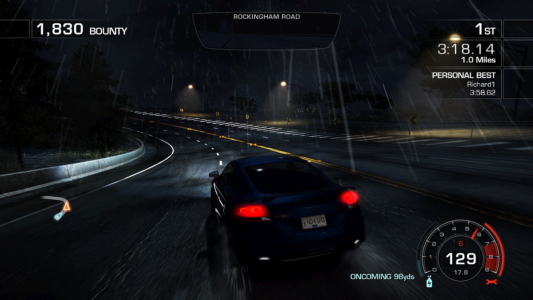
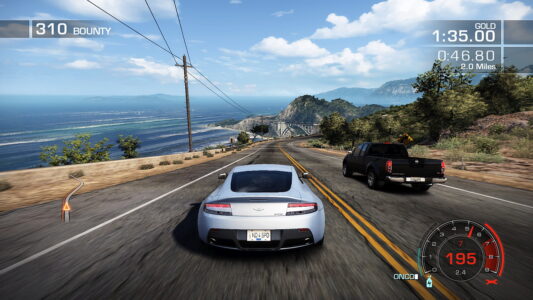
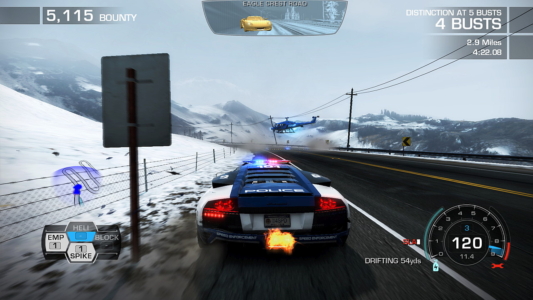
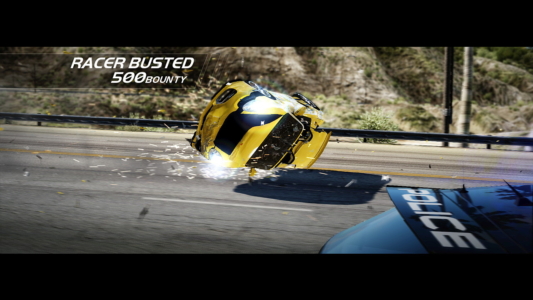

 Posts
Posts
Thanks, Rik, for this excellent non-sport review. 😉
Years ago, I bought this NFSHP but could not play it because it requires internet activation malware. With your pleasant paper, it’s *almost* as if I had played this game I’ll never see in action — and I don’t do warez, even though I’ve bought this damn DVD !
(Oh, and yes, you have regular readers)
July 8, 2018 @ 5:13 pm
I played the Steam version – what is it about the DVD boxed edition that requires an online presence? Or is it that you have to activate it online somehow?
July 12, 2018 @ 9:56 am
Yes, the DVD edition requires Steam activation malware. 🙁
Anyway, the *loss* is for the games publishers : before this online madness *even for offline gaming*, I was a heavy buyer (about 1000 DOS and Win9X/WinXP games, bought second hand or new) and I even had build a database of all these nice serial numbers one had to enter before being allowed to run Safedisc, Starforce and other nuisances. When Steam and the like became accepted without much thinking by all gamers, I merely stopped buying and playing newer games (and I don’t do warez). I do know I’ve lost a few good experiences (I would have liked to play Fable III, Dishonored and a few others), from what I read (including here thanks to your site !), but after all, a good game is like a good book : it can be experienced twice or more times. Fortunately, I have a nice collection of *legal* floppy disks (yes !), CDs and DVDs. 😉
The few advantages of steamed software is steam to me, by forcing me to let a publisher do what he wants with *my* PC and buying choices — not mentionning a PC without any Internet connexion is much safer !
I have bought six or seven Steam games (including the latest Shadow Warrior and Mass Effect 3) hoping that some day a nocd would allow me to play them, but in vain. And I don’t feel like rebuying them should they appear on GOG — they have already fully been paid for.
Oops, sorry for being that long about this minor topic and lost cause. 😉
July 12, 2018 @ 1:29 pm
Well, if it isn’t the game I personally dubbed “The last good Need for Speed game”.
August 16, 2018 @ 8:16 pm
Out of interest, Allard, were/are you a fan of Burnout Paradise?
August 17, 2018 @ 9:00 am
Well, not really. Don’t get me wrong, I did enjoy it, it’s a legitimately good game, but it just does some things that aren’t my cup of tea. Not a fan of free-form checkpoint racing idea. It’s in my “games I might actually give a proper playthrough” list.
August 17, 2018 @ 2:37 pm
I played Paradise for about an hour at a time on a few occasions, thought “this is quite good but I’ll come back to it” then never did. Maybe I will one day.
August 17, 2018 @ 6:58 pm